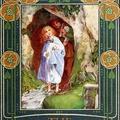CHAPTER 17, part 2
When he went away he left other six gentlemen behind him, that there might be six of them always on guard.
And now, in the lovely spring weather, Irene was out on the mountain the greater part of the day. In the warmer hollows there were lovely primroses, and not so many that she ever got tired of them. As often as she saw a new one opening an eye of light in the blind earth, she would clap her hands with gladness, and unlike some children I know, instead of pulling it, would touch it as tenderly as if it had been a new baby, and, having made its acquaintance, would leave it as happy as she found it. She treated the plants on which they grew like birds' nests; every fresh flower was like a new little bird to her. She would pay visits to all the flower-nests she knew, remembering each by itself. She would go down on her hands and knees beside one and say:
'Good morning! Are you all smelling very sweet this morning?
Good-bye!' and then she would go to another nest, and say the same. It was a favourite amusement with her. There were many flowers up and down, and she loved them all, but the primroses were her favourites.
'They're not too shy, and they're not a bit forward,' she would say to Lootie. There were goats too about, over the mountain, and when the little kids came she was as pleased with them as with the flowers. The goats belonged to the miners mostly-a few of them to Curdie's mother; but there were a good many wild ones that seemed to belong to nobody. These the goblins counted theirs, and it was upon them partly that they lived. They set snares and dug pits for them; and did not scruple to take what tame ones happened to be caught; but they did not try to steal them in any other manner, because they were afraid of the dogs the hill-people kept to watch them, for the knowing dogs always tried to bite their feet. But the goblins had a kind of sheep of their own--very queer creatures, which they drove out to feed at night, and the other goblin creatures were wise enough to keep good watch over them, for they knew they should have their bones by and by.

